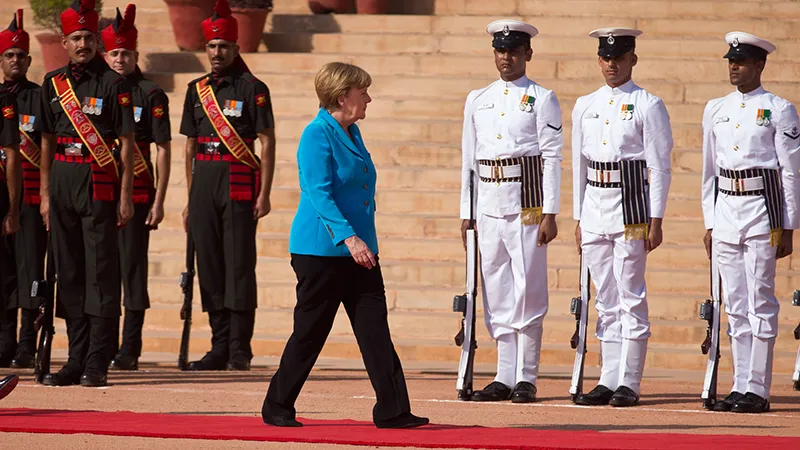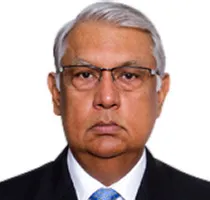-
CENTRES
Progammes & Centres
Location
After 70 years of being constrained, following its defeat in two world wars and being partitioned into East and West Germany, a unified Germany is today poised to be a great power again, having overcome its historical legacy of militarism, and the Holocaust. And German Chancellor Merkel's visit underlines the changed dynamics of the relationship between India and Germany.

China has been the defining feature of the international order in the latter part of the 20th century. But in the 21st century that order will be redefined, not only by China, but also by Japan India, Germany and Russia in Eurasia. After 70 years of being constrained, following its defeat in two world wars and being partitioned into East and West Germany, a unified Germany is today poised to be a great power again, having overcome its historical legacy of militarism, and the Holocaust.
Led by the remarkable Chancellor Angela Merkel, often called the most powerful woman leader in the world today, Germany is regaining its role in the international order, commensurate with its economic power and influence. The world and India are welcoming the rise of Germany. Merkel's handling of the refugee crisis has been applauded globally and put her among the front ranks of those likely to be considered for the Nobel Peace prize this year. It would be a fitting tribute as Germany celebrated its Unity Day as National Day on 8 October, to mark the fall of the Berlin Wall twenty-five years ago.
Highs and lows
Merkel's recent visit to India marks another milestone in India-Germany relations. Bilateral ties that already embrace a comprehensive array of issues, including those of strategic significance, have been ramped up further. Trade and investment are crucial areas with bilateral trade having reached almost $17 billion. Germany is already the seventh biggest investor in India. Indian investment is over $6 billion in Germany.
India was one of the first countries to recognise the Federal Republic of Germany and waived its right to claim reparations since Indian soldiers had fought in the war against Germany. The Cold War and India's opting for non-alignment put Germany and India in different blocs, as the Federal Republic of Germany was integrated into the Western camp with East Germany in the Soviet bloc.
Differences surfaced when India integrated the Portuguese colony of Goa in 1961, as Germany decided to back Portugal. In 1971, during Bangladesh's War of Liberation, Germany was critical of India and when India went for a peaceful nuclear test in 1974, the Germans displayed their arrogance by asserting that a poor country like India should not have nuclear weapons.
Merkel's visit underlines the changed dynamics of the relationship between India and Germany. The two countries have joined hands in pushing for permanent Security Council membership in the United Nations. Germany has been a valued development partner for several decades and since 1958 has provided around $14 billion as assistance to India in a variety of projects. Germany today hosts over 140,000 people of Indian origin, many of whom are professionals in fields of IT, banking, technical expertise, nursing and business.
Fruitful visit
India-Germany ties have entered a new phase with consolidation and growth. They have agreed to cooperate in the energy and high technology sectors in the context of the 'Make in India' and 'Digital India' programmes. Eighteen bilateral agreements have been signed during the Merkel visit and keeping in mind the climate change conference coming up in December in Paris, the two countries have put out a joint statement on climate change, energy and technology - the centre piece of which is the "Indo-German Climate and Renewable Alliance" which seeks to build a comprehensive partnership in the field of renewable energy.
An important outcome of the visit is the setting up of a "fast track mechanism" for approving and assisting German investments in India. Japan is the only other country which enjoys this special facility. While almost all major German companies with global brand recognition are in India, most foreign investors complain about endemic corruption, red tape, bureaucratic inefficiency and inadequate infrastructure that they have to face in India.
Germany's role in reviving the India-EU free trade talks will be crucial and Prime Minister Narendra Modi has made a special appeal to Merkel to take the lead in this context. India had called off talks when the EU banned 700 Indian pharma companies from exporting to EU because one company was found wanting on quality standards.
Germany's role is changing. It does not share the same objectives with the US vis-à-vis Russia, and seeks accommodation in the Eurasian landscape. There is little traction in Germany for a renewed Cold War in Europe. India-Germany ties are a part of the expanding arena of cooperation that began with the strategic partnership in 2001. Merkel's visit is part of her country's search for a new role in global affairs that is logical for a less inhibited Germany. For India too, aspiring to be a leading power, the congruence with Germany is opportune as the international order grows increasingly multipolar.
This article originally appeared in The Quint.
The views expressed above belong to the author(s). ORF research and analyses now available on Telegram! Click here to access our curated content — blogs, longforms and interviews.

Pinak Chakravarty was a Visiting Fellow with ORF's Regional Studies Initiative where he oversees the West Asia Initiative Bangladesh and selected ASEAN-related issues. He joined ...
Read More +